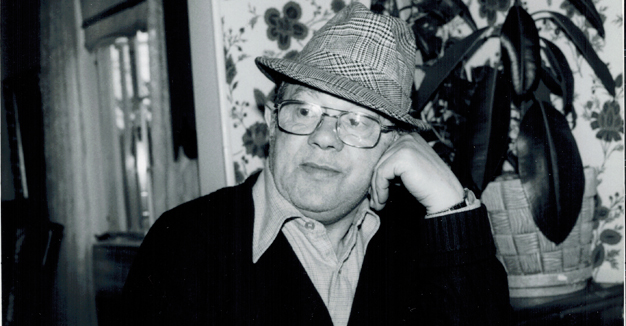די באַליבטע צײַטונג פֿון מײַן טאַטן, דעם פֿאַרמער
My Father the Farmer and His Favorite Newspaper
פֿון העלענע קאַמיאָנער (ריווערדייל, נ״י)
Scroll down for English
דאָס איז טייל פֿון אַ סעריע פֿאָרווערטס־זכרונות פֿון אונדזערע לייענער, וואָס זענען אָפּגעדרוקט געוואָרן אינעם סאַמע לעצטן געדרוקטן נומער, אַפּריל 2019
מיר זענען געווען אַ ייִדיש־רעדנדיקע משפּחה, געקומענע פֿון פּוילן, און געוווינט האָבן מיר אויף אַ פֿאַרם לעבן לייקוווּד, ניו־דזשערזי.
איך געדענק גוט ווי דער טאַטע, יחיאל (כיל) קאַמיאָנער ז״ל פֿלעג יעדן אָוונט אַרײַנקומען פֿון פֿעלד און זיך אַוועקזעצן אין זײַן פֿאָטעל לייענען דעם פֿאָרווערטס. נישט קיין לאָקאַלע צײַטונגען האָט ער געלייענט און נישט די ניו־יאָרק טײַמס. בלויז דעם פֿאָרווערטס. איך געדענק שוין נישט ווי אַזוי ער האָט זיך אַבאָנירט אויף דעם. מסתּמא האָט מײַן ברודער הענרי ז״ל אים געקויפֿט די צײַטונג.
בשעת דער טאַטע איז געזעסן מיט פֿאָרווערטס האָב איך אַליין געפּרוּווט איבערלייענען די ייִדישע ווערטער; ער האָט געקליבן נחת דערפֿון. איך פֿלעג איבערלייענען די קליינע אַנאָנסן פֿון שארית־הפּליטהניקעס וואָס האָבן געזוכט זייערע קרובֿים, ווי אויך מזל־טובֿ־מעלדונגען, רעקלאַמעס פֿונעם שדכן סידני פֿילדס און ואַחרון אַחרון חבֿיבֿ — די רעצעפּטן וואָס די מאַמע ז״ל האָט מיט חשק אויסגעשניטן פֿון פֿאָרווערטס.
לעבן אונדזער פֿאַרם איז געשטאַנען אַ צווייטע פֿאַרם, אויך אָנגעפֿירט פֿון פּוילישע ייִדן וואָס האָבן איבערגעלעבט דעם חורבן. אַן אָפֿטער גאַסט בײַ זיי איז געווען אַ ייִדיש־רעדער מיט אַ פֿײַנעם חוש הומאָר וואָס האָט געאַרבעט בײַם פֿאָרווערטס; ער פֿלעג ענטפֿערן אויף די שאלות פֿון לייענער אינעם „בינטל בריוו‟.
בעת מײַנע פֿאָרשונגען וועגן ייִדישן לעבן אין פֿאַרמלחמהדיקן פּוילן, האָב איך זיך דערוווּסט אַז מע האָט אַרויסגעגעבן מער ווי 23 צײַטונגען אויף ייִדיש אין וואַרשע, די היים פֿון אַזוי פֿיל ייִדישע שרײַבער. בײַ אַ סך פֿון אונדז האָט דער פֿאָרווערטס רעפּרעזענטירט סײַ אונדזער פֿאַרלוסט, סײַ אונדזער צוקונפֿט און האָט אַזוי פֿיל צוגעגעבן צו אונדזער פֿאָלק. אַ שיינעם דאַנק.
My Father, The Farmer, and His Favorite Newspaper
Helene Kamioner (Riverdale, NY)
Part of a series of Forverts memories by our readers, published in the very last paper edition of the Forverts, April 2019
We were a Yiddish-speaking family of immigrants, living on a farm outside of Lakewood, New Jersey. The most vivid memory I have of my father, Chil Kamioner z”l, was of his coming inside the house from the farm, and settling in his chair with the Forward every single night.
Sometimes, I would lean over his chair and try my hand at reading Yiddish and he would be so proud. No local papers, no New York Times, just the Forward. I don’t remember exactly how he got the subscription, but I believe my brother Henry z”l must have bought it for him.
There was another farm next to ours, also owned by Polish Jewish Holocaust survivors, and they had a frequent guest, a humorous Yiddish-speaker who, back in the day, wrote for Bintl Brief.
I remember reading small ads from survivors who were looking for traces of lost family, congratulatory notes, ads by Sidney Fields the matchmaker and most of all, the precious recipes my mother z”l lovingly cut out from its pages.
In my ongoing quest to learn about Yiddishkeit in pre-war Poland, I learned that there were more than 23 Yiddish papers in Warsaw, home of so many Yiddish writers and culture. For so many of us the Forverts represented our loss, our future and gave so much to undzer folk. A shaynem dank.
די לעצטע אַרטיקלען
The Yiddish Daily Forward welcomes reader comments in order to promote thoughtful discussion on issues of importance to the Jewish community. In the interest of maintaining a civil forum, The Yiddish Daily Forwardrequires that all commenters be appropriately respectful toward our writers, other commenters and the subjects of the articles. Vigorous debate and reasoned critique are welcome; name-calling and personal invective are not. While we generally do not seek to edit or actively moderate comments, our spam filter prevents most links and certain key words from being posted and The Yiddish Daily Forward reserves the right to remove comments for any reason.






